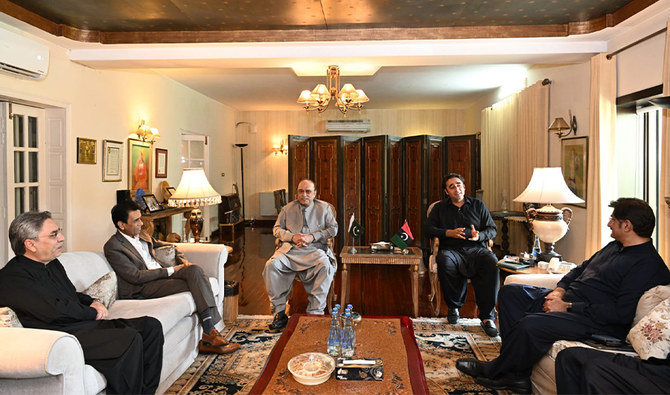KARACHI: Pakistan’s leading opposition figures on Wednesday asked Prime Minister Imran Khan to resign after a major coalition partner formally announced to abandon the government, making the ruling Pakistan Tehreek-e-Insaf (PTI) party lose its majority in the national assembly.
Minister for information Chaudhry Fawad Hussain said earlier in the day the prime minister would not step down after the Muttahida Qaumi Movement-Pakistan (MQM-P) struck a deal with the opposition Pakistan People’s Party (PPP) and signaled it would vote against Khan in a no-confidence vote expected to take place early next month.
“The prime minister should set a new tradition by handing in his resignation after losing his numerical strength [in the national assembly],” said Shehbaz Sharif, leader of the opposition in the national assembly, during a joint news conference with other politicians who want to bring down the government.
He said the agreement between the PPP and MQM-P had taken place within 20 minutes during a meeting of their leaders last night while congratulating the two parties for setting aside their past political differences.
PPP chairman Bilawal Bhutto-Zardari also agreed with Sharif, saying that Khan should step down.
“Prime Minister of Pakistan Imran Khan has lost his majority,” he said. “Today, MQM Pakistan has joined the opposition ranks. Shehbaz Sharif has rightly given a challenge in the spirit of statesmanship to [PM Khan to] resign.”
The PPP leader added: “The prime minister does not have any option. Either he should resign or come to the parliamentary session tomorrow to settle this issue.”
He maintained the prime minister’s removal would help Pakistan resume its democratic journey again.
Without the vote of the MQM-P, Khan’s PTI administration would fall short of the 172 needed to retain power. Khan’s four coalition parties have a total of 20 seats in the lower house of parliament.
However, the prime minister’s close aides have ruled out the possibility of his resignation despite the recent setback.
“Prime Minister Imran Khan is a player who plays until the last ball,” the information minister said on Twitter, adding the PM would not resign.
Even before the MQM-P’s joint news conference with the opposition parties, MQM leaders Syed Aminul Haque, federal minister for IT and Telecom, and law minister Farogh Naseem, had resigned from their posts.
Speaking to Arab News, Faisal Karim Kundi, the PPP’s central information secretary, confirmed that the MQM-P had decided to join the opposition.
“The MQM-P will formally announce the decision and [make] public the points of the deal but I can just tell that Sindh’s governorship for the MQM-P is one of the agreed points of the deal,” Kundi said, referring to giving the coveted slot of the governor of the southern Sindh province to the MQM-P in exchange for siding with the opposition alliance.
“The united opposition and MQM have reached an agreement,” Bhutto-Zardari also announced on Twitter, adding that the agreement would be ratified by the executive committees of both parties and the details shared with the public in a press conference. “Congratulations Pakistan.”

Bilawal Bhutto-Zardari, co-chairperson of PPP (2nd from L), former President Asif Ali Zardari (3rd from L) meets MQM-P Deputy Convener Dr Khalid Maqbool Siddiqui (2nd from L) in Islamabad, Mar 30, 2022. (PPPP/Twitter)
Pakistani opposition legislators have been wooing ruling party legislators away for weeks and tabled a no-confidence motion against Khan in parliament Monday, hoping to oust his government amid accusations he has mismanaged the economy and governed poorly.
Khan came to power in a 2018 election, securing 176 seats. He needs 172 votes to remain in power but about a dozen lawmakers from his ruling party have defected, weakening his position.
The ruling PTI accuses the opposition of bribing its lawmakers to vote against the prime minister. It has also filed a presidential reference in the supreme court seeking an interpretation of Article 63-A, which sets down rules in the constitution for the disqualification of lawmakers in the case of defection and violation of party policy. Khan’s party is calling for the lifetime disqualification of defectors.
On Tuesday, Khan directed all ruling party members to abstain from the no-confidence vote.












